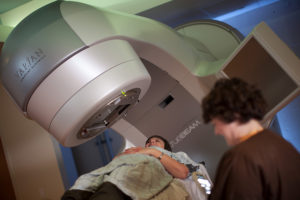The Department of Human Oncology has radiation oncologists who specialize in treating head and neck cancer. These highly skilled and experienced physicians work collaboratively with other members of the clinical team to deliver the highest level of care throughout each step of treatment—from initial consultation to follow-up. To learn more about these specialists, click the links below.
Providers
Team Care
Our radiation oncologists work with a talented team of surgeons, medical oncologists, radiologists, pathologists, speech and swallow therapists, nutritionists, nurses and therapists to provide each patient with outstanding, compassionate, personalized care. Each week, this team of providers meets to review and discuss each patient’s condition and treatment options.
State-of-the-art Treatment Approaches
 Patients with head and neck cancer can be confident that they are receiving the highest quality care that uses the latest technology and treatment approaches.
Patients with head and neck cancer can be confident that they are receiving the highest quality care that uses the latest technology and treatment approaches.
When appropriate, we offer patients the opportunity to participate in clinical trials that will help define the standard of care over the next 50 years. These trials enable your physicians to work toward the ultimate goal of improving treatments for patients throughout Wisconsin and the world.
Clinical Trials

Clinical trials are research studies that investigate ways to prevent, detect or treat cancer. They are at the heart of all medical advances.
Clinical trials for patients undergoing radiation therapy may involve new ways to use existing treatments, new drugs or combinations of drugs and radiation, or new procedures or devices. They may also investigate patients’ quality of life or the effects of a cancer diagnosis on individuals, families or communities.
Many people participate in clinical trials to help future patients. Your doctor may ask you about taking part in a clinical trial. But please note each clinical trial has specific criteria for participation. Only patients who meet these criteria will be able to participate.
Please don’t hesitate to ask your doctor whether there is a UWHealth Head and Neck Cancer clinical trial that is appropriate for you.
Palliative Care
In recent years, it has become clear that palliative care is an essential part of cancer care. Palliative care focuses on improving a patient’s quality of life. It includes measures to reduce pain and treatment side effects and manage the physical and emotional challenges associated with a serious illness.
Our physicians, nurses, social workers and therapists work together to provide palliative care for patients with or without curative treatment for their disease.




